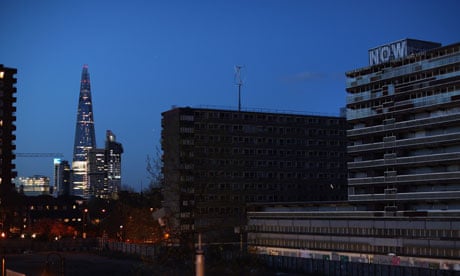Regeneration in London appears to be having some positive impacts: new developments have been built on sites that were once industrial, and long-term population decline has been reversed.
Despite this, urban regeneration has both created and reproduced widening economic and social inequalities in the capital. The trickle-down benefits promised by regeneration schemes, that support of businesses would eventually benefit middle and lower income families, have not materialised.
Tower Hamlets, for example, is still one of the poorest boroughs in the UK even though it has Europe's most ambitious and long-running regeneration project at its heart.
Regeneration in London has become little more than the private sector building expensive properties. More and more housing is being built on and around council estates led by the government under the guise of the "mixed communities policy".
The contrast between disinvested local authority housing stock in London and the highly valuable land it sits on has resulted in poorer people not being able to afford the rents. The increased value of what was once council property means that it is only the developers who are profiting from this.
The "regeneration" of the Heygate and Aylesbury estates in Elephant and Castle and the West Kensington and Gibbs Green estates — part of the £8bn redevelopment of Earls Court, is displacing low and even middle income tenants in their thousands.
Local authorities in London must halt this process and pull back from property-led regeneration schemes that are widening inequalities across London and endangering the distinctive quality of life in the capital. Instead of bulldozing council estates, many of which are structurally sound, and building new so-called "mixed income communities", they should be looking to refurbish existing property, keeping tenants in situ and learning the lessons from the failures of urban renewal in the 1960s and 1970s.
Councils have a moral obligation to protect the less well-off in society. Refurbishment is cheaper than moving people off estates and rebuilding them and is socially, economically and environmentally sustainable. Research by the global architectural, planning and consulting firm Gensler showed how the Heygate estate could be renovated for just £13,955 a home.
The total cost of renovating the 1,200 homes on the Heygate estate would therefore be less than Southwark council have already spent on emptying it. The study also showed how refurbishment would save approximately 40,000 tonnes of CO2 emissions as well as the 450 mature trees currently thriving on the Heygate site.
Councils should also be looking to alternatives, such as the development of "community land trusts" – non-profit organisations that own and manage land by and for a local community, maintaining and developing affordable housing, security of tenure and other community assets on behalf of a community.
London should aim to be a leader in urban policy ideas, to demonstrate creativity and innovation rather than following the same old property-led regenerations of the past that are happening worldwide.
Unlike the people of many other British cities, Londoners have already been sold on the "back to the city" idea, and urban programmes should now focus instead on accommodating urban settlers, not just attracting urban pioneers.
We now need to weigh up both urban and suburban qualities, and take proper account of complaints from critical urbanists about socially unjust, sanitised, privatised, uni-cultural and anti-social developments. In so doing the mayor and local authorities would not only improve our global image on urban policy worldwide but also, more importantly, the everyday lives of ordinary Londoners.
Loretta Lees FRSA is professor at the department of geography at King's College London.
What do you think? Email sarah.marsh@theguardian.com if you want to contribute an article to this debate.
Not already a member? Join us now for more comment, analysis and the latest job opportunities in local government.

Comments (…)
Sign in or create your Guardian account to join the discussion